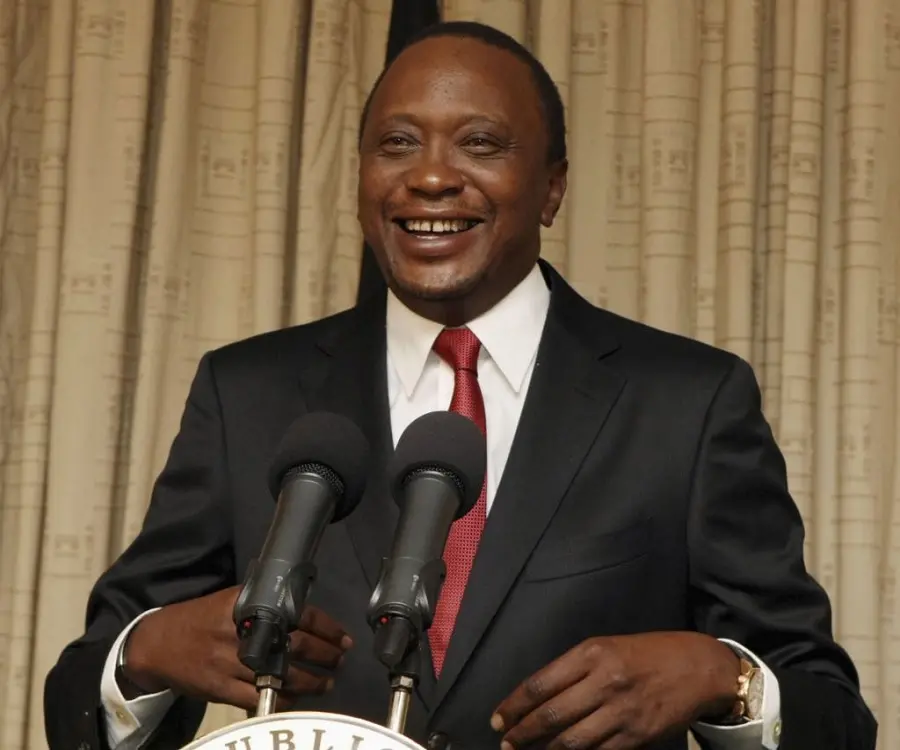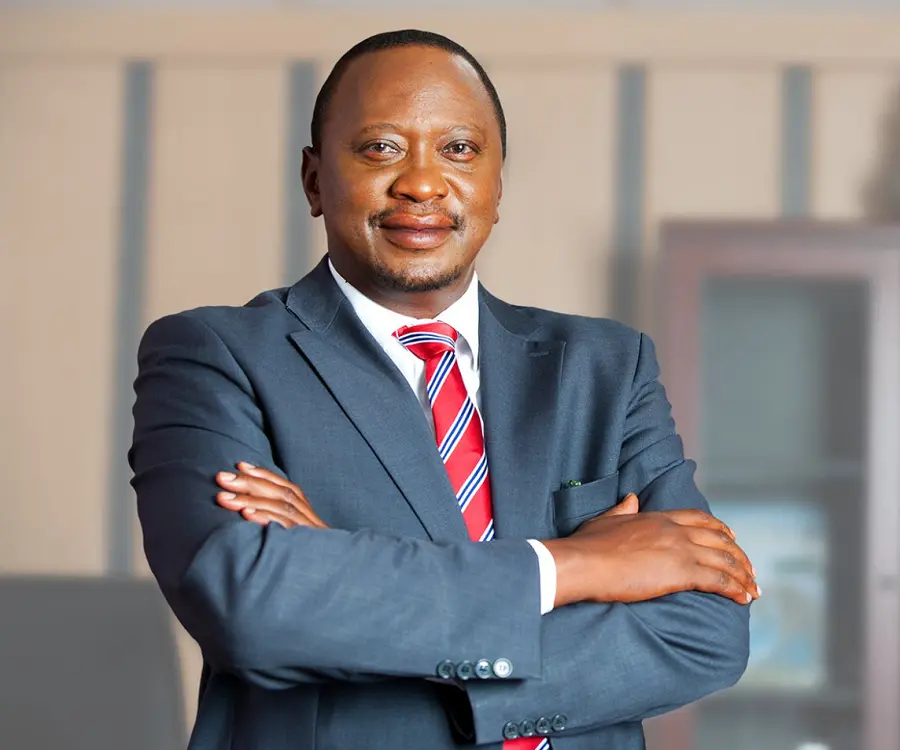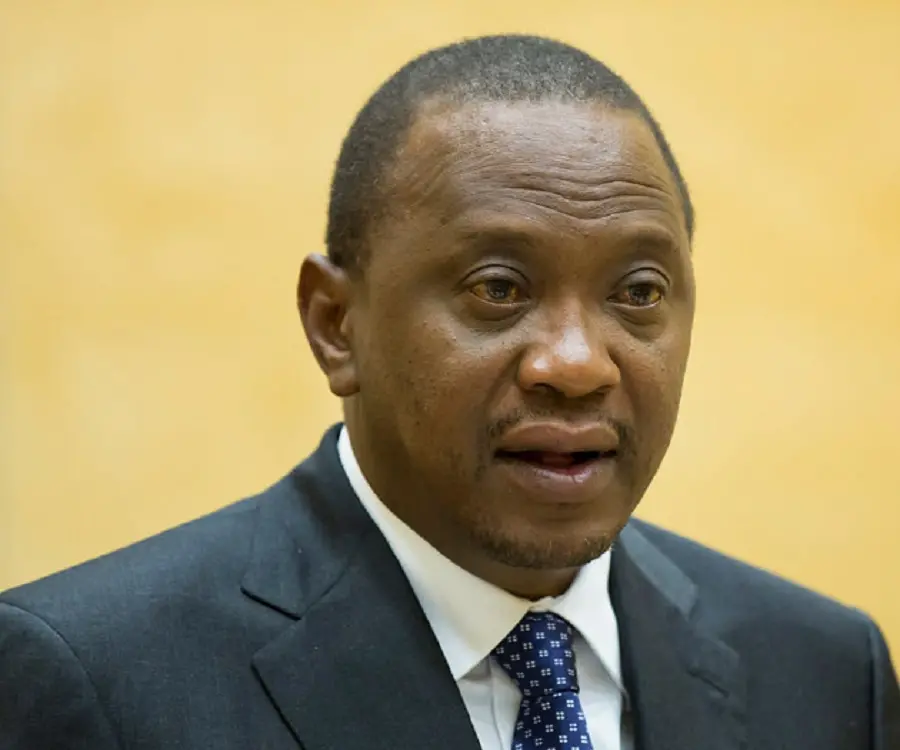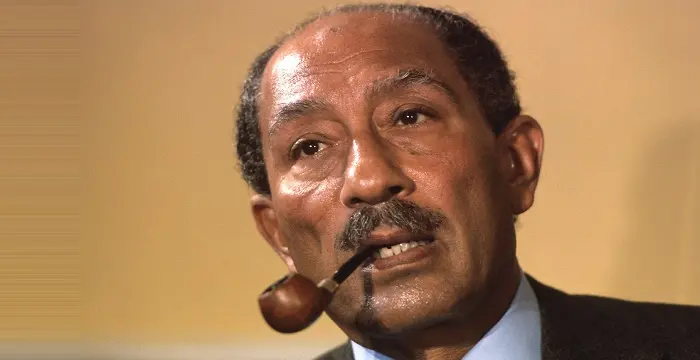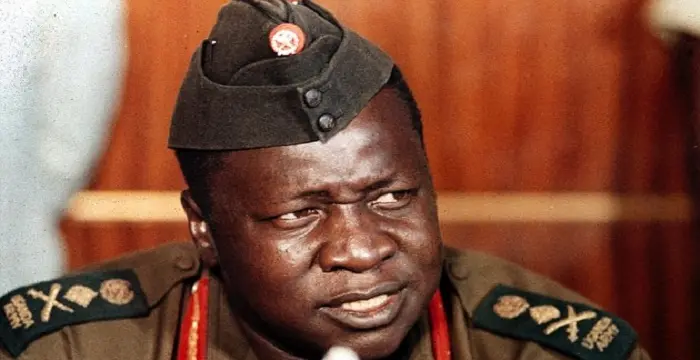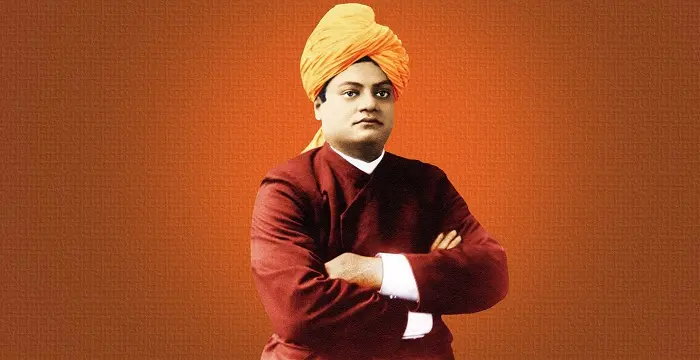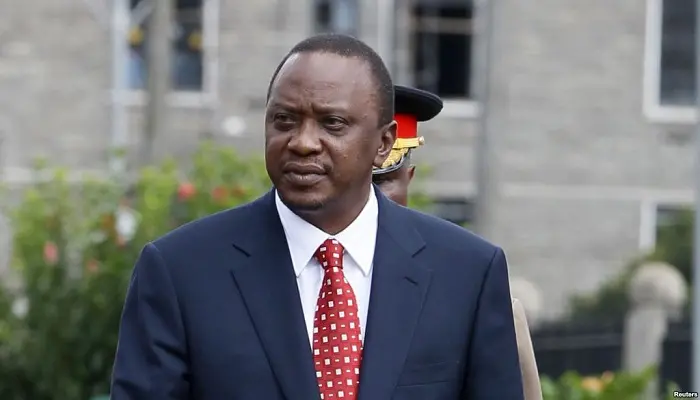
Uhuru Kenyatta - President of Kenya, Birthday and Facts
Uhuru Kenyatta's Personal Details
Uhuru Kenyatta is the fourth and current President of Kenya
| Information | Detail |
|---|---|
| Birthday | October 26, 1961 |
| Nationality | Kenyan |
| Famous | Amherst College, Leaders, Political Leaders, Presidents, President of Kenya |
| Hobbies | Football, Golf, Watching athletics on television |
| Spouses | Margaret Wanjiru Gakuo |
| Known as | Uhuru Muigai Kenyatta |
| Childrens | Jomo Kenyatta |
| Universities |
|
| Notable Alumnis |
|
| Founder / Co-Founder |
|
| Birth Place | Nairobi |
| Political Ideology | Political party TNA (2012–present), KANU (before 2012) |
| Gender | Male |
| Father | Jomo Kenyatta |
| Mother | Ngina Kenyatta |
| Net Worth | $500 million as of Apr 13,2017 |
| Sun Sign | Scorpio |
| Born in | Nairobi |
| Famous as | President of Kenya |
Uhuru Kenyatta's photo
Who is Uhuru Kenyatta?
Uhuru Kenyatta is the fourth and current President of Kenya. Born into a political and wealthy family, he is the son of Jomo Kenyatta, the first President of Kenya. After completing his education from USA, he returned to his homeland and started a horticulture business which became quite successful. But, coming from a political background, he could not remain disconnected from it for long and entered into politics as the chairman of his hometown branch of the ruling party, KANU, which his father had led in the past. Subsequently, Uhuru Kenyatta was appointed as the presidential candidate of the party by the then President Daniel Arap Moi. After losing the presidential elections, he served as the opposition leader in the parliament for some time. Later, he backed the presidential candidate, Kibaki, in the 2007 elections and was appointed as the Deputy Prime Minister and Minister of Finance when Kibaki’s government was formed. Meanwhile, he was also accused of post-election violence activities and charged with committing crimes against humanity. Later, he left KANU and formed a new party TNA which later became a part of a multiparty alliance. He was nominated as the party’s presidential candidate and won the 2013 elections, becoming the fourth President of Kenya, the post he currently serves in. He lists football and golf as his hobbies and loves watching athletics on television
// Famous Political Leaders
Edi Rama
Edi Rama is the current Prime Minister of Albania. Check out this biography to know about his childhood, life, achievements, works & timeline.
Khalifa bin Zayed Al Nahyan
Sheikh Khalifa bin Zayed Al Nahyan is the current President of the United Arab Emirates (UAE). Check out this biography to know about his birthday, childhood, family life, achievements and fun facts about him.
Leo Varadkar
Cam Leo Varadkar is the current Taoiseach—the Prime Minister—of the Republic of Ireland. Check out this biography to know about his childhood, family life, achievements and other facts about his life.
Childhood & Early Life
Uhuru Kenyatta was born on October 26, 1961, in Nairobi, Kenya, to Jomo Kenyatta, the founding father and first President of Kenya. He was raised in a wealthy and politically powerful Kikuyu family.
He received his early education from the St. Mary’s School, Nairobi. After completing high school, he was enrolled at the Amherst College in the United States, where he studied political science and economics.
Career
Upon completing his graduation, Uhuru Kenyatta returned to his homeland and started a company ‘Wilham Kenya Limited’, through which he sourced and exported agricultural produce and became quite successful.
In 1997, he was elected as the chairman of his hometown branch of Kenya African National Union (KANU), the longtime ruling party that his father had once led. Later that year, he contested for a parliamentary seat but lost the election.
Despite his defeat, KANU leader and then Kenyan President, Daniel Arap Moi, seemed intent on preparing him for a greater role in public service. In 1999, Moi appointed him as the chairman of the Kenya Tourist Board.
In 2001, he was nominated by President Moi for a parliament seat. Later, Moi appointed him to the cabinet as Minister for Local Government. The following year, he was elected as one of the four vice-chairs of KANU.
In 2002, he was also nominated as the KANU candidate for the presidency by outgoing President Moi, who was ineligible to stand for another term and wanted someone of his own choosing to succeed him.
However, Moi’s plans backfired as some KANU members left the party to support opposition leader Mwai Kibaki, who conveniently defeated Kenyatta in the elections. Then Kenyatta assumed the position of opposition leader in the parliament from January 2003 to December 2007.
In 2005, he was elected the chairman of KANU. Though he decided to contest Kenya’s next presidential election in December 2007, he withdrew his candidacy a few months before the election and instead opted to back Kibaki, who was running for re-election against Raila Odinga.
When the 2007 election results showed that Kibaki had narrowly defeated Odinga, the outcome was rejected by many of the latter’s supporters, followed by widespread violence along ethnic lines for several weeks.
Kibaki initially made Kenyatta the Minister of Local Government in January 2008, but later when a coalition government formed, Uhuru was appointed as the Deputy Prime Minister and Minister of Trade. The next year, in January 2009, he was moved from the post of Minister of Trade to the Minister of Finance, a post he served in until January 2012.
In 2010, he was accused by the International Criminal Court (ICC) as one of the suspects for instigating the post election violence that followed the 2007 election polls. Shortly after his charges were announced, he resigned as Minister of Finance but remained on his post as Deputy Prime Minister, which he retained until becoming the president of Kenya.
The ICC charges did not discourage him from once again aiming for the presidency. In April 2012, he left KANU and the following month, he launched a new party, The National Alliance (TNA). Later that year, he and TNA became part of a multiparty alliance known as the ‘Jubilee Coalition’.
In the 2013 elections, he was nominated as the presidential candidate by the party. He went on to win the presidential election in the first round of voting, held on March 4, 2013. He was sworn in as president on April 9, 2013, and has been serving in this post since then.
Major Works
He supervised the implementation of a new government administrative unit of counties, which replaced the previous unit of provinces. He also tactfully dealt with the complaints of poor governance, corruption, and insecurity.
Personal Life & Legacy
In 1991, he married Margaret Gakuo Kenyatta. The couple is blessed with three children, Jomo, Jaba and Ngina.
// Famous Presidents
Khalifa bin Zayed Al Nahyan
Sheikh Khalifa bin Zayed Al Nahyan is the current President of the United Arab Emirates (UAE). Check out this biography to know about his birthday, childhood, family life, achievements and fun facts about him.
Anwar Sadat
Anwar Sadat was the third President of Egypt and has been awarded the Nobel Prize for his peace initiatives. To know more about his childhood, career, profile and timeline read on the following biography.
Idi Amin
A Ugandan dictator, Idi Amin is remembered for his brutal regime and crime against humanity. Check this biography to know in details about his life, childhood, profile and timeline.
Uhuru Kenyatta biography timelines
- // 26th Oct 1961Uhuru Kenyatta was born on October 26, 1961, in Nairobi, Kenya, to Jomo Kenyatta, the founding father and first President of Kenya. He was raised in a wealthy and politically powerful Kikuyu family.
- // 1991In 1991, he married Margaret Gakuo Kenyatta. The couple is blessed with three children, Jomo, Jaba and Ngina.
- // 1997In 1997, he was elected as the chairman of his hometown branch of Kenya African National Union (KANU), the longtime ruling party that his father had once led. Later that year, he contested for a parliamentary seat but lost the election.
- // 1999Despite his defeat, KANU leader and then Kenyan President, Daniel Arap Moi, seemed intent on preparing him for a greater role in public service. In 1999, Moi appointed him as the chairman of the Kenya Tourist Board.
- // 2001In 2001, he was nominated by President Moi for a parliament seat. Later, Moi appointed him to the cabinet as Minister for Local Government. The following year, he was elected as one of the four vice-chairs of KANU.
- // 2002In 2002, he was also nominated as the KANU candidate for the presidency by outgoing President Moi, who was ineligible to stand for another term and wanted someone of his own choosing to succeed him.
- // Jan 2003 To Dec 2007However, Moi’s plans backfired as some KANU members left the party to support opposition leader Mwai Kibaki, who conveniently defeated Kenyatta in the elections. Then Kenyatta assumed the position of opposition leader in the parliament from January 2003 to December 2007.
- // 2005 To Dec 2007In 2005, he was elected the chairman of KANU. Though he decided to contest Kenya’s next presidential election in December 2007, he withdrew his candidacy a few months before the election and instead opted to back Kibaki, who was running for re-election against Raila Odinga.
- // 2007When the 2007 election results showed that Kibaki had narrowly defeated Odinga, the outcome was rejected by many of the latter’s supporters, followed by widespread violence along ethnic lines for several weeks.
- // 2007 To 2010In 2010, he was accused by the International Criminal Court (ICC) as one of the suspects for instigating the post election violence that followed the 2007 election polls. Shortly after his charges were announced, he resigned as Minister of Finance but remained on his post as Deputy Prime Minister, which he retained until becoming the president of Kenya.
- // 2008 To 2009Kibaki initially made Kenyatta the Minister of Local Government in January 2008, but later when a coalition government formed, Uhuru was appointed as the Deputy Prime Minister and Minister of Trade. The next year, in January 2009, he was moved from the post of Minister of Trade to the Minister of Finance, a post he served in until January 2012.
- // Apr 2012The ICC charges did not discourage him from once again aiming for the presidency. In April 2012, he left KANU and the following month, he launched a new party, The National Alliance (TNA). Later that year, he and TNA became part of a multiparty alliance known as the ‘Jubilee Coalition’.
- // 2013In the 2013 elections, he was nominated as the presidential candidate by the party. He went on to win the presidential election in the first round of voting, held on March 4, 2013. He was sworn in as president on April 9, 2013, and has been serving in this post since then.
// Famous Leaders
Edi Rama
Edi Rama is the current Prime Minister of Albania. Check out this biography to know about his childhood, life, achievements, works & timeline.
Tecumseh
Tecumseh was a Native American leader of the Shawnee clan. This biography profiles his childhood, life and timeline.
Khalifa bin Zayed Al Nahyan
Sheikh Khalifa bin Zayed Al Nahyan is the current President of the United Arab Emirates (UAE). Check out this biography to know about his birthday, childhood, family life, achievements and fun facts about him.
Anwar Sadat
Anwar Sadat was the third President of Egypt and has been awarded the Nobel Prize for his peace initiatives. To know more about his childhood, career, profile and timeline read on the following biography.
Leo Varadkar
Cam Leo Varadkar is the current Taoiseach—the Prime Minister—of the Republic of Ireland. Check out this biography to know about his childhood, family life, achievements and other facts about his life.
Swami Vivekananda
Swami Vivekananda was the chief disciple of Sri Ramakrishna, and was responsible for awakening India spiritually. Check this biography to know in detail about his life, profile and timeline.
Uhuru Kenyatta's FAQ
What is Uhuru Kenyatta birthday?
Uhuru Kenyatta was born at 1961-10-26
Where is Uhuru Kenyatta's birth place?
Uhuru Kenyatta was born in Nairobi
What is Uhuru Kenyatta nationalities?
Uhuru Kenyatta's nationalities is Kenyan
What is Uhuru Kenyatta hobbies?
Uhuru Kenyatta's hobbies is Football, Golf, Watching athletics on television
Who is Uhuru Kenyatta spouses?
Uhuru Kenyatta's spouses is Margaret Wanjiru Gakuo
Who is Uhuru Kenyatta childrens?
Uhuru Kenyatta's childrens is Jomo Kenyatta
What was Uhuru Kenyatta universities?
Uhuru Kenyatta studied at Amherst College, 1979 - St. Mary's School, Nairobi, 1989 - Amherst College
What was Uhuru Kenyatta notable alumnis?
Uhuru Kenyatta's notable alumnis is Amherst College
Which company or organization was founded by Uhuru Kenyatta?
Uhuru Kenyatta was the founder/co-founder of Jubilee Alliance
What is Uhuru Kenyatta's political ideology?
Uhuru Kenyatta's political ideology is Political party TNA (2012–present), KANU (before 2012)
Who is Uhuru Kenyatta's father?
Uhuru Kenyatta's father is Jomo Kenyatta
Who is Uhuru Kenyatta's mother?
Uhuru Kenyatta's mother is Ngina Kenyatta
What is Uhuru Kenyatta's sun sign?
Uhuru Kenyatta is Scorpio
How famous is Uhuru Kenyatta?
Uhuru Kenyatta is famouse as President of Kenya
